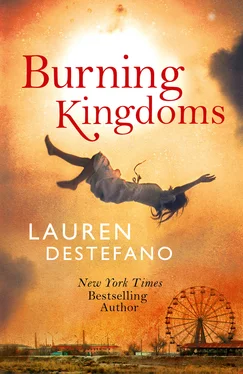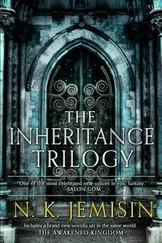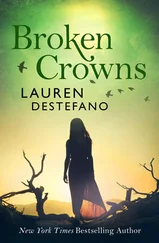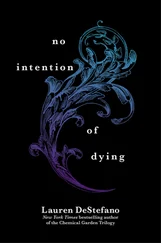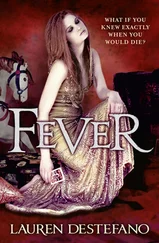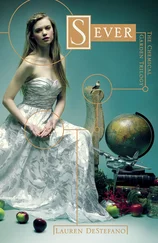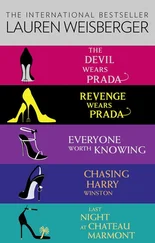“Have you ever seen one up close?” I say.
“Once. I was fishing with Nim, and his hook got caught up in her hair. She let out this wail, I swear, that could be heard from the heavens. Scared him so much, he dropped the pole, which may have been what she was after. They like to collect human things. Which reminds me, mind your jewelry. I saw one jump up and snatch the beads right off a woman’s neck.” She presses her hat against her head at the memory.
Pen and I close our fists around our betrothal bands.
The ocean waves slap against the ferry, more turbulent than any of the lakes back home. It’s no wonder; the ocean is filled with so many creatures swimming about.
“There could be cities underwater,” Pen says. “A whole society with buildings made up of human things.”
“There’s more shrimp than you could ever eat,” Birdie says.
Pen makes a face. “Do those have human hair, too?”
Birdie laughs. Out here, her eyes aren’t downcast. She isn’t all “please” and “thank you” and “yes, Father” this and that. She tells us about all the sea creatures she can think of—hard little fish that look like stars and crawl like hands along the ocean floor, and whales that could swallow a village if they had a mind to.
“A fish big enough to swallow a person.” Pen is giddy. “What a hilarious way to die, in the digestive tract of a fish.”
“Whales aren’t fish,” Birdie says, which is all the more absurd a notion.
“You live in a strange world, Birdie,” Pen says.
The ferry comes to a stop, and once we’re on land again, I topple dizzily into the two of them, which sends us all into giggles. We collect a few stares from passersby, but they mean nothing. We are young and enchanted and clattering with beads. We are untouchable.
I find myself very aware of the ground under my feet. It’s unlike the cobbles back home. Rather, it’s solid and black, and its paths branch out like a flat tree, all of them leading to bright lights and music and possibility.
“Cinema’s this way,” Birdie says, tugging us by the wrists.
“It hardly seems like you’re at war,” I say.
“That’s how King Ingram prefers it,” she says.
“You’ve met him?” Pen says.
“Lots of times. Father has him over for dinner when there are matters to discuss. It’s a real honor. The king’s paranoid about poisons and he doesn’t trust a lot of people to prepare his meals.”
“Our king doesn’t come out of hiding much either,” Pen says. “He and his family live in a clock tower that’s full of dungeons.”
“How medieval. Here we are, girls!”
The cinema is a wedge-shaped building, the top of which is framed by a strip of light, and the words “ETIENNE JONES DOUBLE FEATURE.”
“What an unusual sign,” I say.
“It’s a marquee,” Birdie says. She hands silver coins to a man behind the glass and we go inside. She leads us into a dimly lit room that’s full of chairs and already crowded. “You’re going to love it,” she says.
Pen is eyeing the girls in the front row who are passing a bottle among them, taking swigs. I can smell from here that it’s some kind of tonic, which wouldn’t be allowed in public back home.
Nobody here seems to mind.
I clear my throat loudly. “What was that name on the building?”
“Etienne Jones,” Birdie says. “She’s the biggest star in the kingdom. Wait till you see her.”
I stare at the giant screen that takes up the wall before us like a giant image waiting to be developed.
Then the screen goes black and music starts to play. Pen loops her arm around mine and squeezes. The world doesn’t seem so scary now that she’s in good spirits. It’s not all warfare and doom.
The moving picture is gray and jumpy. Lips move and then the words appear for us to read. Etienne Jones has bobbed hair and ringed eyes, and when she walks down the street, she kicks her heels, and all the men watch, dropping hatboxes and getting elbowed by their wives.
But the image is merely a projection. The screen is only fabric. And though our screens on Internment are much smaller and are never used for entertainment, they are more advanced than this. I wonder how it could be that our tiny floating city could be ahead on any of the technology.
For hours, we watch the antics of the upbeat actors on the screen, our laughter a roar that blends in with everyone else’s.
By the time we make our way back to the streets, I have no idea what the hour may be.
“I heard that story you were telling earlier,” Birdie says. “About the dark times and the solar energy.”
“It’s from our history book,” Pen says.
“She knows all the stories,” I say.
“Have you seen the ginormous black book on your nightstand? That’s The Text of All Things ,” Birdie says. “Father insists on leaving one for all the guests. Thinks he can save everyone’s soul. I think it’s all a lot of baloney, myself. Most of it, anyway.”
“Was it written by prophets like our history book?” Pen asks.
“Prophets, yes.”
“And the god of the ground told them what to write?”
“Well.” Birdie checks her reflection in a shop window and begins twirling a lock of hair. “We don’t say ‘the god of the ground.’ It’s just ‘The God.’”
“Just the one? For the ground and the sky and everything?” Pen asks.
“I think so,” Birdie says.
Pen looks at me like this is the stupidest thing she has ever heard, and maybe it is. I scan the city, hoping for something I can use to change the subject. Thomas is right. This is the sort of talk that can send her spiraling.
Whether or not it’s a welcome one, a distraction finds us in the form of brassy music streaming through a door that’s been left ajar. Pen stops us from walking and looks inside. There’s the smell of smoke and tonic. Giggles and clatters. Sparkling drinks floating on trays.
Pen is hypnotized. “What is this?” she says, swatting me when I try to pull her away. I follow her gaze to a woman who is gyrating on a table. Her beads swish around her throat in shimmering ovals, and she kicks her leg in an arch right over the head of some lovesick boy. Her lips are red, and I see now what Birdie has been trying to model herself after.
“It’s a brass club,” Birdie says. Her voice is almost too soft to hear.
Pen, stars in her eyes, takes a step forward, but Birdie pulls her back. “We can’t go in there,” she gasps.
Pen looks with heartbreak at the hand that’s holding her back. “Why not?”
“We just … can’t,” Birdie says.
“It must be late,” I say.
“We’re already going to have to sneak back in,” Pen says. “Why not have a little more fun?”
Birdie stutters and looks worriedly over her shoulder.
“Don’t hold out on us now,” Pen says. “I saw you come home after the stars had gone to bed.” With that, she plunges into the crowd.
“I’m so sorry, Birdie, she can be like this,” I say, and hurry after her. I can’t imagine the trouble Pen could get into in a place like this, with tonic shimmering in glasses everywhere.
Pen has already progressed through curtain after curtain of smoke. She’s made a direct beeline for the dancing woman, who is tall and so skinny, she’s concave. A man at the table holds what must be her shoes.
The dancing woman smiles at Pen, and it’s as though they have a sort of kinship somehow, for in the dancing woman’s eyes is a melancholy under all that cosmetic.
Or maybe the melancholy belongs to me. I can’t be certain.
The music doesn’t cease, but it changes. The dancing woman climbs down, and as she does, the man who holds her shoes leans in for a kiss. “Sorry, Mac,” she says, smiling with all her teeth. “The bank’s closed.”
Читать дальше
